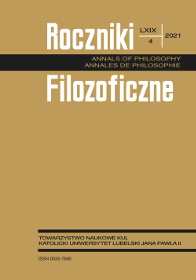Prawda, Jej aspekty ontologiczne i idea intelektu nieskończonego w Badaniach logicznych Edmunda Husserla
The Truth, Its Ontological Aspects and the Idea of Infinite Intellect in Edmund Husserl’s Logical Investigations
Author(s): Rafał LewandowskiSubject(s): Philosophy, History of Philosophy, Philosophical Traditions, Logic, Contemporary Philosophy, Phenomenology
Published by: Towarzystwo Naukowe KUL & Katolicki Uniwersytet Lubelski Jana Pawła II
Keywords: correspondence theory of truth; ontological theory of truth; alethiology; truth as the fulfilment; infinite intellect; phenomenology; direct knowledge
Summary/Abstract: This article aims to analyze the theory of truth contained in Edmund Husserl’s Logical Investigations. In my analysis, I start from a detailed description of conditions of the possibility of truth based on Husserl’s alethiology. I show that his theory assumes correlation, the parallelism between subjective and objective conditions of the possibility of cognition as a condition of truth. Based on this, I explain Husserl’s interpretation of the correspondence definition of truth found in Logical Investigations. I also provide arguments that this interpretation presupposes the ontological definition of truth and the idea of the infinite intellect as the ideal of a direct and exhaustive presentation of the object of cognition. Nonetheless, my conclusions don’t provide a complete interpretation of Husserl’s alethiology because I refrain from drawing metaphysical consequences from it. That is to say, I neither answer the question about realism/idealism in Logical Investigations nor the question of whether the idea of the infinite intellect should be understood in some metaphysical way (e.g. theistic one) or only as a regulative idea in the Kantian sense.
Journal: Roczniki Filozoficzne
- Issue Year: 69/2021
- Issue No: 4
- Page Range: 83-124
- Page Count: 42
- Language: Polish

